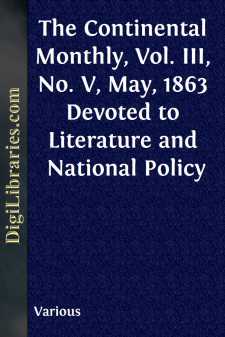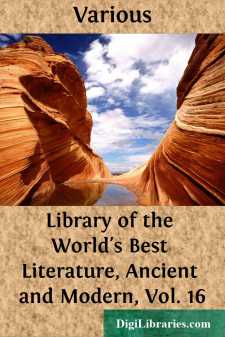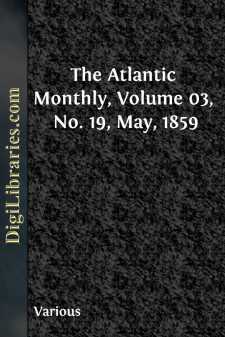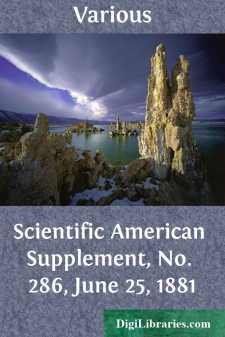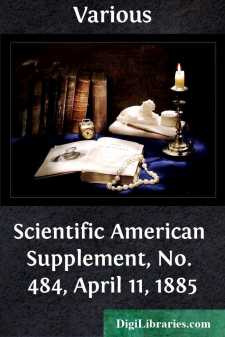Categories
- Antiques & Collectibles 13
- Architecture 36
- Art 48
- Bibles 22
- Biography & Autobiography 813
- Body, Mind & Spirit 141
- Business & Economics 28
- Children's Books 12
- Children's Fiction 9
- Computers 4
- Cooking 94
- Crafts & Hobbies 4
- Drama 346
- Education 46
- Family & Relationships 57
- Fiction 11826
- Games 19
- Gardening 17
- Health & Fitness 34
- History 1377
- House & Home 1
- Humor 147
- Juvenile Fiction 1873
- Juvenile Nonfiction 202
- Language Arts & Disciplines 88
- Law 16
- Literary Collections 686
- Literary Criticism 179
- Mathematics 13
- Medical 41
- Music 40
- Nature 179
- Non-Classifiable 1768
- Performing Arts 7
- Periodicals 1453
- Philosophy 64
- Photography 2
- Poetry 896
- Political Science 203
- Psychology 42
- Reference 154
- Religion 513
- Science 126
- Self-Help 83
- Social Science 81
- Sports & Recreation 34
- Study Aids 3
- Technology & Engineering 59
- Transportation 23
- Travel 463
- True Crime 29
The Continental Monthly, Vol. III, No. V, May, 1863 Devoted to Literature and National Policy
by: Various
Categories:
Description:
Excerpt
THE GREAT PRAIRIE STATE.
I should not wonder if some of your readers were less acquainted with this Western Behemoth of a State than with the republic of San Marino, which is about as large as a pocket handkerchief. The one has a history, which the other as yet has not, and of all people in the world, our own dear countrymen—with all their talk about Niagara, and enormous lakes, and prodigious rivers—care the least for great natural features of country, and the most for historical and romantic associations. When an Englishman, landing at New York, begins at once to inquire for the prairies, it is only very polite New Yorkers who can refrain from laughing at him.
But it is not so much of natural features that I wish to speak at present. Illinois has been abused lately; brought into discredit by the misbehavior of some of her sons; but this only makes her loyal friends love her the more, knowing well how good her heart is, how high-toned her feeling, how determined her courage.
Looking at this State from New York, the image is that of a great green prairie, the monotony of whose surface is scarcely broken by the rivers which cross it here and there, and the great lines of railroad that serve as causeways through the desperate mud of spring and winter. A scattered people, who till the unctuous black soil only too easily, and leave as much of the crop rotting on the ground through neglect as would support the entire population; rude though thriving towns, where the grocery and the tavern, the ball room and the race course are more lovingly patronized than the church, the Sunday school, and the lyceum; where party spirit runs high, and elections are attended to, whatever else may be forgotten; where very unseemly jokes are current, and language far from choice passes unrebuked in society; in short, where what are known as 'Western characteristics' bear undisputed sway, making their natal region anything but a congenial residence for strangers of an unaccommodating disposition—such is the picture.
It were useless to deny that most of the points here indicated would be recognized and placed on his map by a Moral and Social topographer who should make the tour of the entire State from Cairo to Dunleith, both inclusive; but it is none the less certain that if he noted only these he would ill deserve his title. Cicero had a huge, unsightly wart on his eloquent nose; the fair mother of Queen Elizabeth, a 'supplemental nail' on one of her beautiful hands; Italy has her Pontine Marshes, New York city her 'Sixth Ward'; but he must be a green-eyed monster indeed who would represent these as characteristics. Illinois deserves an explorer with clear, kind eyes, and a historiographer as genial as Motley. All in good time. She will 'grow' these, probably. While we are waiting for them, let us prepare a few jottings for their use.
A great State is a great thing, certainly, but mere extent or mere material wealth, without intellectual and social refinement and a high moral tone, can never excite very deep interest. Not that we can expect to find every desirable thing actually existent in a country as soon as it is partially settled and in possession of the first necessities of human society. But we may expect aspirations after the best things, and a determination to acquire and uphold them. These United States of ours—God bless them forever!—have a constitutional provision against the undue preponderance of physical advantages over those of a higher kind. Rhode Island (loyal to the core), and Delaware (just loyal enough to keep her sweet), each sends her two Senators to Congress; and huge Illinois—whom certain ill-advised Philistines are trying to make a blind Samson of—can send no more. If we say the State that sends the best men is the greatest State (for the time, especially the present time), 'all the people shall answer Amen!' for one loyal heart, just now, is more precious than millions of fat acres. Whether Illinois could prudently submit to this appraisal, just at the present moment, remains to be proved; but that her heart is loyal as well as brave, there can be no question.
Without going back, in philosophical style, to the creation of the world, we may say that the State had a good beginning. Father Marquette and his pious comrade Allouez, both soldiers of the Cross, explored her northern wilds for God, and not for greed. They saw her solid and serene beauty, and presaged her greatness, and they did all that wise and devoted Catholic missionaries could do toward sanctifying her soil to good ends forever. They found 'a peaceful and manly tribe' in her interior, the name Illinois signifying 'men of men,' and the superiority of the tribe to all the other Indians of the region justifying the appellation. Allouez said, 'Their country is the best field for the gospel,' and he planted it as well as he could with what he believed to be the Tree of Life, long nourished with the prayers and tears of himself and his successors. The Indians took kindly to the teaching of the good and wise Frenchman, and it is said that even after troubles had begun to arise, owing, as usual, to the misconduct of rapacious and unprincipled white settlers, many of the Indians held fast by their newly adopted faith, and even showed some good fruits of it in forbearance and honesty of dealing....


